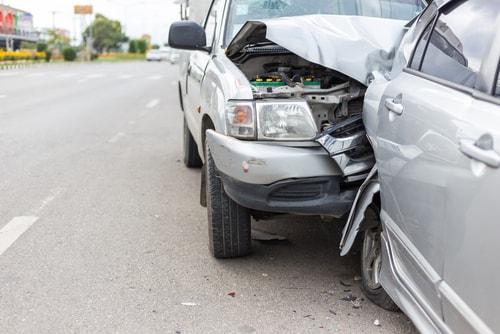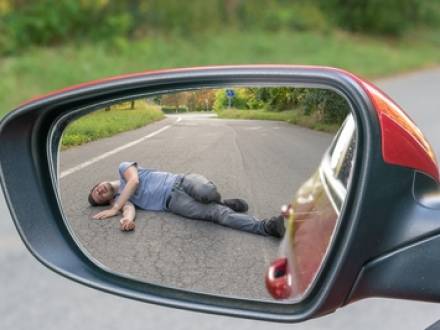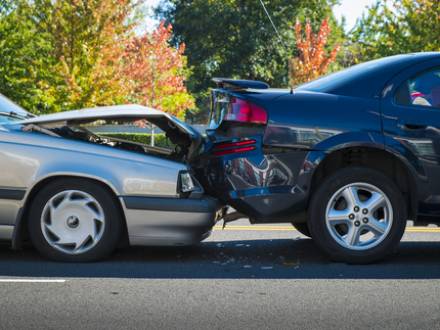Recent Blog Posts
Will a Truck Accident Settlement Cover Future Lost Income?
 A truck accident settlement can include compensation for future lost income if your injuries affect your ability to work. When a crash causes serious harm, the financial impact often goes far beyond your current medical bills. Understanding whether future earnings can be recovered in a personal injury claim is an important step in protecting your financial future.
A truck accident settlement can include compensation for future lost income if your injuries affect your ability to work. When a crash causes serious harm, the financial impact often goes far beyond your current medical bills. Understanding whether future earnings can be recovered in a personal injury claim is an important step in protecting your financial future.
According to the Federal Motor Carrier Safety Administration, large trucks were involved in more than 168,000 injury crashes in a recent year across the United States. The claims are common, and Quinn Law Group, LLC has experience helping people get the compensation they need. If you are dealing with the effects of a serious collision in 2026, our Elgin, IL personal injury lawyer helps injured individuals pursue compensation that reflects both current losses and future needs.
Rear-End Collisions: Who Is at Fault? | IL Injury Lawyer
 OIn most rear-end collisions, the driver who hits the vehicle in front is usually considered at fault. Illinois law expects drivers to stay alert, control their speed, and leave enough space to stop safely. When a driver fails to do that and crashes into the back of another vehicle, responsibility often follows.
OIn most rear-end collisions, the driver who hits the vehicle in front is usually considered at fault. Illinois law expects drivers to stay alert, control their speed, and leave enough space to stop safely. When a driver fails to do that and crashes into the back of another vehicle, responsibility often follows.
Rear-end crashes are common in Illinois, especially among personal injury claims. If you were injured in or near Lake County, a Wheeling, IL car accident lawyer can help explain how fault is evaluated under Illinois law. As of 2026, Illinois continues to rely on negligence rules to determine responsibility in these accidents.
Why Is the Rear Driver Usually at Fault for an Accident?
Common reasons the rear driver is blamed include distraction, speeding, or delayed braking. Illinois drivers must follow basic safety rules, including watching traffic ahead and keeping a safe following distance. When a rear-end collision happens, it often shows that the rear driver was following too closely or did not react in time.
How Long Does a Car Insurance Claim Take After an Accident?
 There is no single answer to how long a car insurance claim takes. Some claims settle in a few weeks, while others take months or even longer. The timeline depends on the details of the crash, the injuries involved, and how the insurance company responds. As of 2026, Illinois car accident claims still require clear proof of fault, complete medical records, and careful negotiation with insurance companies. Rushing or missing steps can slow the process even more.
There is no single answer to how long a car insurance claim takes. Some claims settle in a few weeks, while others take months or even longer. The timeline depends on the details of the crash, the injuries involved, and how the insurance company responds. As of 2026, Illinois car accident claims still require clear proof of fault, complete medical records, and careful negotiation with insurance companies. Rushing or missing steps can slow the process even more.
Delays are common, even in straightforward cases. In fact, according to the 2025 J.D. Power U.S. Auto Claims Satisfaction Study, the average cycle time for repairable vehicle claims was about 19.3 days. Injury claims often take much longer. If you are waiting on a claim, a Skokie, IL car accident lawyer can help you understand what is reasonable and when delays may signal a problem.
Why Is My Insurer Fighting My Hit-and-Run Accident Claim?
 Although Illinois law requires drivers to remain at the scene of an accident, many do not. In fact, AAA’s Foundation for Traffic Safety estimates that in some years, there are over 735,000 hit-and-run crashes. Drivers, passengers, pedestrians, and motorcyclists hurt in hit-and-run accidents are left to wonder who is responsible for paying their damages. After a hit-and-run crash, most people expect their own uninsured/underinsured motorist (UM/UIM) coverage to help.
Although Illinois law requires drivers to remain at the scene of an accident, many do not. In fact, AAA’s Foundation for Traffic Safety estimates that in some years, there are over 735,000 hit-and-run crashes. Drivers, passengers, pedestrians, and motorcyclists hurt in hit-and-run accidents are left to wonder who is responsible for paying their damages. After a hit-and-run crash, most people expect their own uninsured/underinsured motorist (UM/UIM) coverage to help.
Among other situations, this type of coverage is supposed to pay damages when the at-fault driver cannot be identified. Many people do not realize that once you file a UM/UIM claim, your own insurance company can become an adversary. If you are hurt in a hit-and-run car accident in 2026, our experienced Des Plaines, IL car accident lawyer can fight for you.
What to Do if a Speeding Driver Rear-Ends You in Illinois
 A rear-end crash happens in a split second, but the physical, financial, and emotional consequences last much longer. While being crashed into from behind can always be dangerous, if the driver who hit you was speeding, the risks of serious injuries and vehicle damage are even higher.
A rear-end crash happens in a split second, but the physical, financial, and emotional consequences last much longer. While being crashed into from behind can always be dangerous, if the driver who hit you was speeding, the risks of serious injuries and vehicle damage are even higher.
Twenty-nine percent of car accidents involve some kind of rear-end collision, according to the National Highway Traffic Safety Administration. This means a large portion of car crash injury claims come from rear-end accidents as well. In Illinois, the law protects people who are hurt by negligent drivers, and speeding is one of the clearest forms of negligence on the road.
If you were rear-ended by a speeding driver, you may be able to recover compensation for your injuries, vehicle repairs, lost income, and pain and suffering by filing a personal injury claim. Knowing what to expect after the crash can help you take the right steps to protect your health and your legal rights. A qualified Glenview, IL car accident lawyer can help you make informed decisions that best suit you.
Filing a Lawsuit Against an Illinois Grocery Store for a Slip-and-Fall Case
 Grocery stores owe customers a duty to maintain reasonably safe premises. When they fail in that duty and you get hurt in a slip-and-fall or other accident, Illinois law allows you to seek damages. Understanding how premises liability works and what you need to prove helps you know if you have a valid case.
Grocery stores owe customers a duty to maintain reasonably safe premises. When they fail in that duty and you get hurt in a slip-and-fall or other accident, Illinois law allows you to seek damages. Understanding how premises liability works and what you need to prove helps you know if you have a valid case.
Our Des Plaines, IL personal injury attorney can talk you through your case and help you decide whether you want to move forward. We offer free consultations and contingency billing, so you risk nothing by talking to us and you only pay if we win your case.
What Do You Have to Prove in a Grocery Store Slip-and-Fall Case?
Illinois law under 740 ILCS 130/ addresses negligence standards for premises liability. The law requires you to prove several things:
How Can I Prove Someone Merged Into My Lane and Caused a Crash?
 Car accidents caused by one vehicle merging into another vehicle are common on busy Illinois roads. This is especially true in high-traffic areas like Park Ridge and the surrounding suburbs. But proving that another driver merged into your lane and caused the crash can be difficult, especially if the other driver says you were at fault.
Car accidents caused by one vehicle merging into another vehicle are common on busy Illinois roads. This is especially true in high-traffic areas like Park Ridge and the surrounding suburbs. But proving that another driver merged into your lane and caused the crash can be difficult, especially if the other driver says you were at fault.
If you were injured in a lane-change accident in 2025, you may be entitled to compensation. The key to a successful claim is having the right evidence. An experienced Des Plaines, IL car accident lawyer can help you build a strong case to prove the other driver’s fault.
When Do You Have the Right of Way in a Lane Change?
Illinois traffic laws require all drivers to stay in their lane and only change lanes when it is safe. Under 625 ILCS 5/11-709, a driver must stay in a single lane "as nearly as practicable" and cannot move into another lane until the move can be made safely.
Recent Head-On Crashes on Illinois Highways Cause Serious Injuries and Death
 On June 25, 2025, a car traveling southbound on the northbound side of I-294 in Glenview caused a fatal head-on crash. On August 4, another person was hospitalized after a serious head-on crash on I-90 in Illinois. These large, busy highways are dangerous, and head-on crashes at high speeds frequently leave drivers and passengers badly injured or worse.
On June 25, 2025, a car traveling southbound on the northbound side of I-294 in Glenview caused a fatal head-on crash. On August 4, another person was hospitalized after a serious head-on crash on I-90 in Illinois. These large, busy highways are dangerous, and head-on crashes at high speeds frequently leave drivers and passengers badly injured or worse.
These accidents are often caused when a driver under the influence of drugs or alcohol is so impaired that they get on the highway going the wrong way. If you or someone you love has been injured in a head-on crash on an Illinois highway, you may be entitled to compensation from the person who caused the accident. Our Glenview, IL car crash injury attorney takes these cases seriously and fights hard for our clients to get the justice they deserve.
What to Do When Your Spouse is Killed in a Car Accident
 Losing a spouse in a car accident is the kind of sudden tragedy that keeps many of us awake at night. When it happens to you, you may initially be in disbelief. Figuring out what to do next can feel impossible. Even once you begin to accept what happened, grief can make it hard to think about your own needs.
Losing a spouse in a car accident is the kind of sudden tragedy that keeps many of us awake at night. When it happens to you, you may initially be in disbelief. Figuring out what to do next can feel impossible. Even once you begin to accept what happened, grief can make it hard to think about your own needs.
If this sounds like you, you should talk to a Park Ridge personal injury lawyer with Quinn Law Group, LLC. We have helped many people recover after losing a loved one to a car accident, and we appreciate the gravity of these cases. Attorney Quinn handles each case personally, providing support and guidance through this difficult time. Plus, we offer free consultations so you take no risk by talking to us.
What Should I Do First After Losing My Spouse in a Fatal Accident?
Serious car crashes are scenes of confusion and chaos. If you or other family members are injured, the first thing you need to do is get medical attention right away, even if you already left the crash site. Injuries are not always immediately apparent, and a medical evaluation can provide necessary proof of harm.
What Happens When an Hours of Service Violation Causes a Truck Crash?
 To reduce fatigue-related truck crashes, the Federal Motor Carrier Safety Administration (FMCSA) sets rules known as Hours of Service (HOS). These rules limit how many hours truckers can drive before they are obligated to rest. Unfortunately, some drivers and companies break these rules, putting everyone on the road at risk.
To reduce fatigue-related truck crashes, the Federal Motor Carrier Safety Administration (FMCSA) sets rules known as Hours of Service (HOS). These rules limit how many hours truckers can drive before they are obligated to rest. Unfortunately, some drivers and companies break these rules, putting everyone on the road at risk.
If you were hurt in a truck accident, there might have been an HOS violation. Speak to a Glenview, IL personal injury lawyer about how to prove this in your injury claim so you can hold the trucking company accountable.
What Does "Hours of Service" Mean?
Under FMCSA regulations, truck drivers must follow strict limits on driving and rest periods. For example, most drivers cannot drive more than 11 hours after 10 hours off duty, and they must take at least a 30-minute break after eight hours on the road. They also cannot exceed 60 hours of driving in seven days or 70 hours of driving in eight days.
 847-232-7180
847-232-7180






